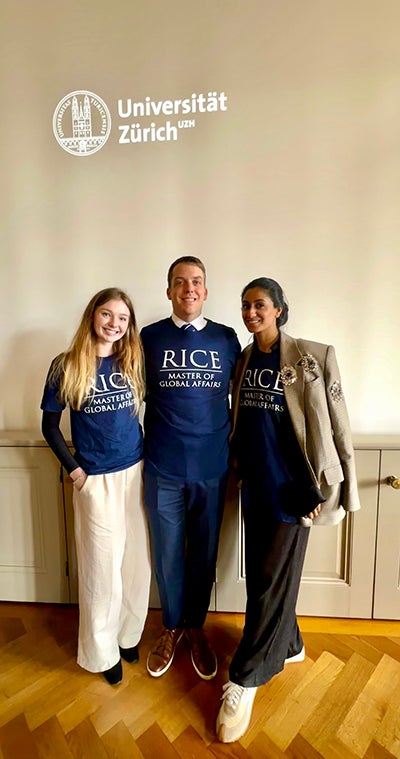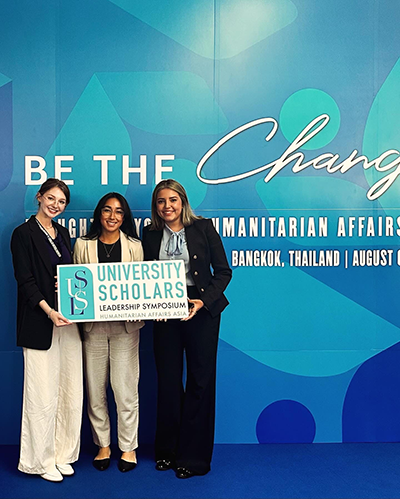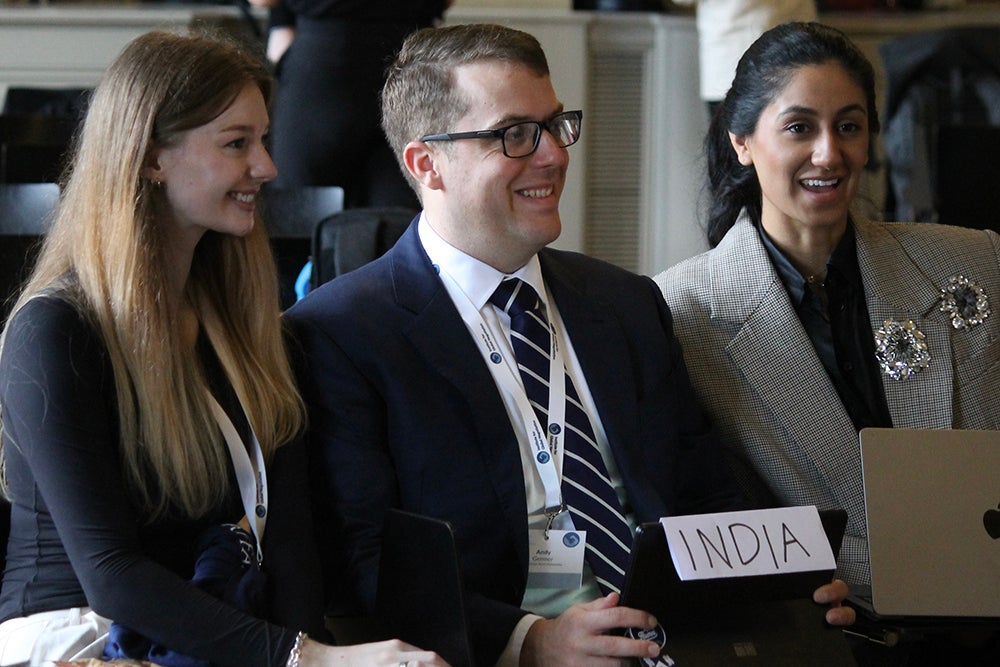This past summer, several students from Rice University’s Master of Global Affairs (MGA) program had the opportunity to travel internationally to two conferences. While at the conferences, the students engaged with peers and leaders from around the world, learning skills in collaboration, global negotiation, and service learning. Funding for their travels was provided by the MGA program. Three of the MGA students who attended one or both of the conferences recently shared their enriching experiences.
The Institute for Global Negotiation’s 2024 Global Negotiation Conference in Zurich
 The Global Negotiation Conference is a four-day event attended by graduate students from all over the world. The theme for the 2024 Global Negotiation Conference was Negotiating the Governance of Emerging Technologies. During the conference, MGA students heard from prominent global negotiators, participated in workshops, engaged in simulation activities, and networked with people from around the world with similar interests.
The Global Negotiation Conference is a four-day event attended by graduate students from all over the world. The theme for the 2024 Global Negotiation Conference was Negotiating the Governance of Emerging Technologies. During the conference, MGA students heard from prominent global negotiators, participated in workshops, engaged in simulation activities, and networked with people from around the world with similar interests.
Hameem Bhatti studied accounting as an undergraduate student at Baylor University and then received her MBA in finance at Southern Methodist University. Now, Bhatti works full-time at JP Morgan, and she is pursuing an MGA degree to gain an understanding of policy as it relates to the economic and financial sphere. After graduation, she hopes to build out a merchant services and cashless payments platform in underdeveloped countries and within the United States.
One of the highlights from the conference, Bhatti noted, was the negotiation simulation.
“On the last day of the conference, we put everything that we had learned from the speakers and the breakout sessions into practice,” said Bhatti. “Everyone represented a country that was not their home country. Our team negotiated on behalf of India, which was really challenging, but also really interesting.”
Anna Lucas, who began as a pre-med student at Baylor University, switched gears and decided to apply for law school. Opting to take some time to decide what kind of law she wants to practice, Lucas now works full-time as an immigration paralegal while enrolled as an MGA student at Rice. Through her studies, Lucas aims to proactively figure out her next steps for when she begins law school at New York University. Attending the Global Negotiation Conference was one such step.
“I was honestly curious about what a negotiation conference would be like because I had never heard of negotiation taught as an academic subject,” said Lucas. “It was basically divided into two parts – one part was learning about what negotiation is, and then the other part was hearing from and speaking with experts in multilateral governance and/or policy and learning about their opinions, which was really valuable.”
Bhatti and Lucas were also joined by their MGA classmate, Andy Germer.
The Humanitarian Affairs Asia 12th Annual University Scholars Leadership Symposium in Bangkok
 The University Scholars Leadership Symposium is a four-day event that brings together people from around the world to collaborate and exchange ideas on ways to change the world. MGA students experienced a program that was focused on leadership, made connections with people from around the world, and learned about how to develop their advocacy skills.
The University Scholars Leadership Symposium is a four-day event that brings together people from around the world to collaborate and exchange ideas on ways to change the world. MGA students experienced a program that was focused on leadership, made connections with people from around the world, and learned about how to develop their advocacy skills.
Originally from Honduras, Kensy Lopez studied political economy and social psychology as an undergraduate student. She applied to the MGA program because of her desire to work in a policy advisory position or in a legislative position to develop laws that will help refugees, immigrants, and minorities.
Lopez noted that she thought the symposium was going to be an academic experience.
“It was actually more about character building,” said Lopez. “They motivated us by saying, ‘Okay, you want to make a difference? Then you have to make something different.’”
The goal at this conference, Lucas observed, was to bring people together who are interested in international careers.
“It wasn’t specifically just for those interested in humanitarian-related areas, but it was for people who want to find a way to give back in some capacity,” said Lucas. “We got to hear from motivational speakers and from people who are leading NGOs and charities.”
Lopez and Lucas were also joined by their MGA classmate, Allyse Volpe. In addition to networking and learning from humanitarian leaders, the students got to experience change-making firsthand by volunteering alongside one another in the community.
Final Thoughts on a Memorable Summer
When asked about the most valuable aspects of the conferences, Lucas, Bhatti, and Lopez all had key takeaways to share.
“For me, the most valuable part of the conferences was the people,” said Lucas. “We got to meet a lot of highly ambitious people who have similar goals. For example, I got to meet people who are interested in cybersecurity and AI governance research with whom I've been able to keep in contact. So, when I'm writing my capstone, I can collaborate with them or ask them questions.”
In addition to the people, Bhatti noted the value of learning about the different challenges within the digital space and digital diplomacy.
“Our negotiation at the Global Negotiation Conference was focused on that topic,” said Bhatti. “Because I want to build out a cashless tap-to-pay product after graduation, it was really interesting to learn about digital space and digital diplomacy.”
Finally, Lopez noted the emphasis placed on being a character-driven leader.
“Character is something that sets us apart, and it will echo in the results that we give,” said Lopez. “As professionals, that is very valuable. What is driving us, and what is setting us apart? What is going to define us as leaders, and what are we going to do that is greater than us?”
Rice University’s Master of Global Affairs is a two-year professional master’s degree co-sponsored by the James A. Baker, III Institute for Public Policy and the School of Social Sciences. Our location in the heart of Houston, Texas provides the perfect setting for students to engage with global energy companies, Fortune 500 organizations, local and Federal government entities, and international nonprofits.

